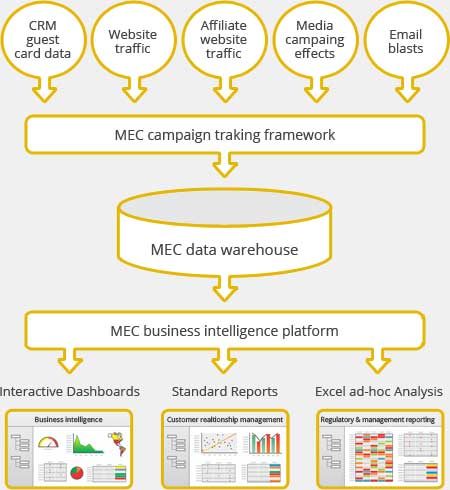
To increase the profitability of our clients by improving the effectiveness of their marketing expenditures. Our clients will see immediate results of all marketing campaign efforts. They will take swift action to remedy poor performing campaigns or media vendors. Likewise, they will aggressively increase budgets to campaigns and vendors that provide the greatest ROI. This vision will be achieved through the integration of Internet marketing behavioral tracking, traditional traffic source collection methods, CRM information, and detail tracking of marketing costs. As an integrated solution, our clients will have a new level of business intelligence to establish actionable insights.
Current Situation:
Background
Companies selling products or services which cannot be purchased via the web (i.e., online merchant services) rely on various marketing channels (e.g., digital ads, print ads, referrals, etc.) to generate quality leads for their product/service. Lead information is often captured via the companies's website guest card, an affiliate website guest card, email, or phone call. This information is entered into a CRM system either by manual entry or automatically. Once inside the CRM system, the companies's sale force uses the CRM data to convert leads into buyers.
Prospects (i.e., persons visiting the sales center) are often asked how they first heard of the product/service to improve marketing efforts. The prospect's response is stored in the CRM system. Marketing departments use visitor responses to the traffic source question to evaluate the effectiveness of the media channel, vendor used, and campaign message. This information is used to determine future spending and campaign plans.
Prospects (i.e., persons visiting the sales center) are often asked how they first heard of the product/service to improve marketing efforts. The prospect's response is stored in the CRM system. Marketing departments use visitor responses to the traffic source question to evaluate the effectiveness of the media channel, vendor used, and campaign message. This information is used to determine future spending and campaign plans.

Some of the challenges
- Internet marketing is a critical component to all marketing plans and introduces new ways of measuring effectiveness. However, many companies continue to measure their marketing campaign efforts by the traditional method – the prospect's response to the traffic source question. In other words, marketing departments are dependent on what people say (i.e., attitudinal response).
- Most companies do not track the ROI of marketing costs. Companies track the marketing expenditures in their accounting system and lead/prospect to buyer conversions in their CRM system. Companies may observe how many leads, prospect, or contracts have originated with a particular traffic source. They may also have an idea of their total marketing costs per prospect and contract. However, most companies cannot provide a true cost effectiveness comparison between vendors (e.g., cost per lead, cost per contract, etc). As a result, companies are challenged with their ability to determine if they are over or under paying for a vendor's service.
- Companies may hire digital ad agencies to help target a specific demographic. But how does the companies know if the ad agency is successful? Are companies able to see the desired demographic converting from the targeted digital source?
- In addition to measuring the number of sales made, companies may also measure a sales reps success by the number of calls made or emails sent. However, are companies measuring the effectiveness of a sales person in converting leads to prospects, or prospects to contracts?
Social networks are a growing phenomenon and a new source for marketing products and services. As companies invest resources to market in this new space, they are in need of a means to measure their marketing success.
The Product/Service:

Data Collection
MEC Business Intelligence Platform
MEC Consulting
The Marketing Expense Control system (MEC) is a marketing Business Intelligence platform which tracks and analyzes marketing campaign, channel, and vendor performance. This is achieved through the integration of Internet marketing behavioral tracking, traditional traffic source collection methods, CRM information, and detail tracking of marketing costs into the MEC data warehouse.

